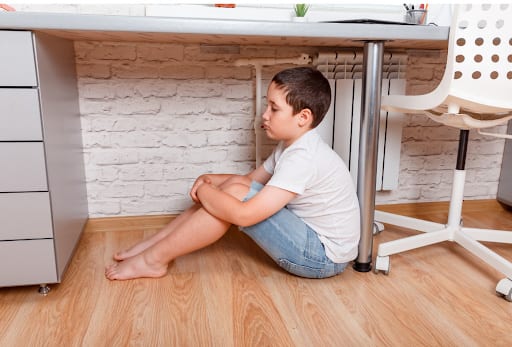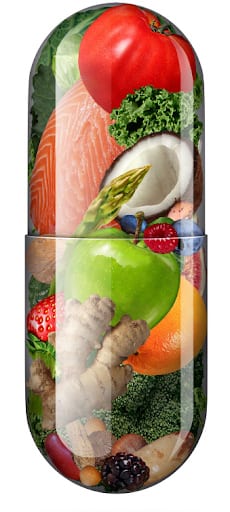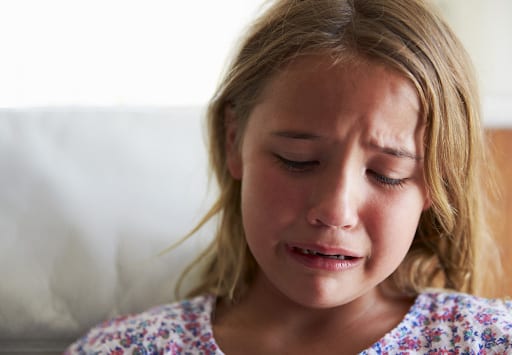If you are reading this, then you already suspect your child is stressed and maybe even clinically anxious. You're worried about their worry.
What are signs of anxiety in a child?
The signs and symptoms of anxiety in children and teens can often be hard to spot. In my blog, dealing with anxiety, I go into depth all the ways anxiety can show up emotionally, behaviorally, socially, and physically.
Parents need to understand that kids can live in a safe home, go to a great school, have good friends and still have stress and anxiety. There is just a lot going on in the world and it can creep up on them. Most kids and teens show anxiety physically. That means they might have sleep problems, digestive issues, headaches and so on.
Parents also want to look for a change in their child. Maybe they are extra crabby, stopped wanting to hang out with family or friends, or are eating less or more. These changes are often missed because they can occur gradually or because parents might associate a change with a clinical issue such as anxiety.
When should I be concerned about my child's anxiety?
If you are questioning if your child is stressed or anxious, then with a very high probability they are. Stress moves to clinical anxiety when it has a significant impact on a child’s or teens daily life in some way. That means at home or school that anxiety is holding them or getting in the way of something.
Does childhood anxiety go away?

Kids don’t just outgrow their anxiety and instead need direct support to deal with it. Sometimes parents think, “How can my child be stressed or anxious” and therefore may miss the connection between those belly aches and anxiety. It is only when we look back can we connect the dots. Every day, I see families who connect the dots after years of struggles before they realize anxiety was the nexus.
How to help a child struggling with anxiety?
The bells are going off and you realize that your kid’s anxiety is an issue. You may be asking yourself, how can I help my child overcome anxiety? Well the first thing you need to do is put your own oxygen mask on!
I talk a lot about my trademarked REPS Protocol™, which is a way for adults and kids to break free from their anxiety, panic, distress, or other uncomfortable emotions and sensations with four steps. In the case of parenting a child with anxiety, you want to apply this to yourself first because our children co-regulate with us, so it is extra important that we take care of ourselves too.
- Resperate
- It all starts with breath. It regulates your autonomic nervous system and helps to keep us in a calm parasympathetic state.
- Envision
- Seeing successful outcomes and in this case seeing you and your child calm is critical.
- Positivity
- Using positive language with kids not only reinforces their actions and makes it more likely that they will learn, it feels good for both of you.
- Stress Management
- Ten minutes a day of a stress management technique is all we need to
To learn more about my REPS Protocol™, check out this YouTube video.
How can I treat my child's anxiety naturally?

You may be wondering, “how to help a child with anxiety without medication?” and questioning if that is even possible. Well it is and we should never jump to medicating our children and teens, as many psychiatric medications are used “off-label.” That means that kids with mental health issues are given medication without research to support their efficacy and more importantly their safety.
I talk a lot about natural remedies for treating anxiety in children and there are many natural treatments for anxiety for children and teens that parents can feel good about – for both safety and efficacy.
Here are some of my favorite natural treatments for anxiety in teens and children:
What vitamins help with calming?

Supplements and herbs for anxiety can really help to regulate the nervous system so a person can regulate and learn new ways to cope with stressors or uncomfortable sensations or emotions. When a person is anxious, they want to avoid stress at all costs but it is when we learn to cope that we build resilience, which is the key to lifelong mental health.
Can yelling at a child cause anxiety?
Yes, frequent yelling at your child can cause anxiety and depression. Yelling isn’t good for your kid or you. No parent wants to yell and your kid is affected on many levels and it can lead to even more serious problems both immediately and in the future.
You should know what happens to a child's brain when you yell because when we understand things from a neuroscience perspective, then it helps us to change our own behavior. When you yell at your child, their nervous system gets stress activated. And the more you yell, the more their CNS gets stress activated and likely to get stuck in a hyper stress state. With long-term stress, the body is always preparing for a war and goes into a fight, flight or freeze state and that is when kids get stuck and much more difficult to treat.
What to say to a child with anxiety?
When it comes to talking to a child with anxiety, you want to use positive language and emphasize coping skills. With today's stressful world, kids need as many tools in their toolkit as possible and learning healthy ways to manage stress is so important for their mental health today and in the future.
Grab the FREE DOWNLOAD, How to Talk to an Anxious Kid for more awesome tips.
What can I do to help my child with anxiety?
Like most of the parents I work with, you are looking for safe and effective ways to help their child or teen deal with stress or clinical issues. Your kid is stuck in fight, flight or freeze and you just don't know what to do to help them. With our trademarked BrainBehaviorReset™ Method, we calm the nervous system first and then teach kids new ways to cope with stress.
Central to our BrainBehaviorReset™ Method is neurofeedback. Neurofeedback is a safe, natural and effective tool that calms down “on fire” brains so a child or teen can not be so reactive, emotional, and stressed. Until that happens, it isn't possible for the brain to learn new ways of responding. The great news is that neurofeedback can be done at home though our center. The first step is a QEEG brain map or a brain check so we can see what is going on and make a successful treatment plan.
Always remember… “Calm Brain, Happy Family™”
Are you looking for SOLUTIONS for your struggling child or teen?
Dr. Roseann and her team are all about solutions, so you are in the right place!
There are 3 ways to work with Dr. Roseann:
You can get her books for parents and professionals, including: It’s Gonna Be OK™: Proven Ways to Improve Your Child’s Mental Health, Teletherapy Toolkit™ and Brain Under Attack: A Resource For Parents and Caregivers of Children With PANS, PANDAS, and Autoimmune Encephalopathy.
If you are a business or organization that needs proactive guidance to support employee mental health or an organization looking for a brand representative, check out Dr. Roseann’s media page and professional speaking page to see how we can work together.
Dr. Roseann is a Children’s Mental Health Expert and Therapist who has been featured in/on hundreds of media outlets including, CBS, NBC, FOX News, PIX11 NYC, The New York Times, The Washington Post,, Business Insider, USA Today, CNET, Marth Stewart, and PARENTS. FORBES called her, “A thought leader in children’s mental health.”

She is the founder and director of The Global Institute of Children’s Mental Health and Dr. Roseann Capanna-Hodge. Dr. Roseann is a Board Certified Neurofeedback (BCN) Practitioner, a Board Member of the Northeast Region Biofeedback Society (NRBS), Certified Integrative Medicine Mental Health Provider (CMHIMP) and an Amen Clinic Certified Brain Health Coach. She is also a member of The International Lyme Disease and Associated Disease Society (ILADS), The American Psychological Association (APA), Anxiety and Depression Association of America (ADAA) National Association of School Psychologists (NASP), International OCD Foundation (IOCDF) International Society for Neurofeedback and Research (ISNR) and The Association of Applied Psychophysiology and Biofeedback (AAPB).
© Roseann-Capanna-Hodge, LLC 2023
Disclaimer: This article is not intended to give health advice and it is recommended to consult with a physician before beginning any new wellness regime. *The effectiveness of diagnosis and treatment vary by patient and condition. Dr. Roseann Capanna-Hodge, LLC does not guarantee certain results.













